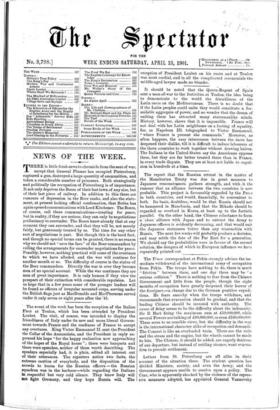NEWS OF THE WEEK.
THERE is little fresh news to chronicle from the seat of war, except that General Plumer has occupied Pietersburg, captured a gun, destroyed a large quantity of ammunition, and taken a considerable number of prisoners. Both strategically and politically the occupation of Pietersburg is of importance. It not only deprives the Boers of their last town of any size, but of their last piece of railway. In addition to this there are rumours of depression in the Boer ranks, and also the state- ment, at present lacking official confirmation, that Botha has , again opened communications with Lord Kitchener. The Boers, of course, call these communications—treating for peace, but in reality, if they are serious, they can only be negotiations preliminary to surrender. The Boers know already that at any moment they can surrender, and that they will be, not merely fairly, but generously treated by us. The time for any other sort of negotiations is past. But though this is the hard fact, and though no special terms can be granted, there is no reason why we should not "save the face" of the Boer commanders by calling the arrangements for surrender negotiations for peace. Possibly, however, nothindpractical will come of the overtures to whieh we have alluded, and the war will continue for another month or so. The difficulty of course is the status of the Boer commanders. Directly the war is over they become men of no special account. While the war continues they are men of great importance. It is only human if they view the prospect of their extinction with considerable repulsion. Let us hope that in a few years some of the younger leaders will be found as officers of irregular mounted corps, serving under the British flags just as Ma.cDonalds and MacPhersons served under it only seven or eight years after the '45.






































